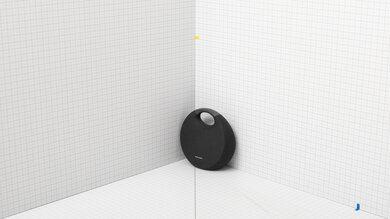The Harman/Kardon Onyx Studio 6 is a portable Bluetooth speaker with a unique rounded design. It's easy to bring with you on-the-go thanks to its integrated handle, and it even has an IPX7 rating for water resistance, though we don't currently test for this. With a neutral, balanced sound profile, it's well suited for listening to a wide range of audio content, though it struggles to reproduce a thumpy low-bass. It doesn't get very loud, either, and it lacks sound customization features like an EQ.
Our Verdict
The Harman/Kardon Onyx Studio 6 is alright for music. It has a very balanced, neutral sound profile that makes it suitable for listening to lots of different music genres. However, like many smaller speakers, it struggles to reproduce a thumpy, punchy low-bass, which can be disappointing if you love bass-heavy genres like hip-hop. It also has to downmix stereo content into mono, which doesn't sound as immersive, and it lacks sound customization features.
- Decent frequency response accuracy.
- Supports multi-device pairing.
- Lacks low-bass.
- Downmixes stereo content into mono.
The Harman/Kardon Onyx Studio 6 is middling for videos and movies. Its neutral, balanced sound profile can reproduce dialogue clearly, but it lacks low-bass, so you don't really feel the deep thump and rumble in action-packed scenes. It has to downmix stereo content into mono, which doesn't sound as immersive. Also, its latency with Android and iOS devices via Bluetooth is likely too high to be suitable for watching videos, though some apps compensate for latency differently.
- Decent frequency response accuracy.
- Lacks low-bass.
- Downmixes stereo content into mono.
The Harman/Kardon Onyx Studio 6 is satisfactory for podcasts. Its balanced mid and treble ranges reproduce clear, accurate, and detailed dialogue. You can also pair it with up to two devices at the same time, making it easy to switch between listening to a podcast on your laptop and listening to an audiobook on your phone. However, it doesn't get very loud, and there's some compression present when you play it at max volume.
- Portable design.
- Supports multi-device pairing.
- Doesn't get very loud; some compression at max volume.
- 4.7-hour battery life.
The Harman/Kardon Onyx Studio 6 doesn't support voice assistants.
The Harman/Kardon Onyx Studio 6 is adequate for outdoor use. This well-built speaker has an IPX7 rating for water resistance, though we don't currently test for this. Its integrated handle makes it really easy to bring on the go. However, its 4.7-hour battery life isn't ideal for long days outside, and it doesn't get very loud.
- IPX7 rating for water resistance.
- Portable design.
- Doesn't get very loud; some compression at max volume.
- 4.7-hour battery life.
Changelog
-
Updated Dec 05, 2024:
We mentioned the Harman/Kardon Go + Play 3 in the Dynamics section of this review.
- Updated Mar 25, 2024: We've added a comparison between this soundbar and the Harman/Kardon Onyx Studio 8 in Soundstage.
- Updated Jul 20, 2022: Clarified that the speaker can't be stereo paired in 'Controls' and 'Soundstage' boxes.
- Updated Feb 16, 2021: Review published.
Check Price
Differences Between Sizes And Variants
The Harman/Kardon Onyx Studio 6 comes in several different color variants: 'Gray', 'Black', and 'Blue'. We tested the 'Gray' variant, and you can see the label for the model we tested here. We expect the other color variants to perform similarly.
If you come across another version, let us know in the discussions, and we'll update our review.
Popular Speaker Comparisons
The Harman/Kardon Onyx Studio 6 is a portable Bluetooth speaker with a very neutral, balanced sound profile out-of-the-box. Its integrated handle makes it easy to bring this speaker with you on-the-go, and it even has an IPX7 rating for water resistance, though we don't currently test for this. However, it has to downmix stereo content into mono to play it, and it doesn't have a lot of sound enhancement features like an EQ. You can also check out our recommendations for the best Bluetooth speakers, the best Bluetooth speakers for bass, and the best waterproof Bluetooth speakers.
The JBL Charge 5 is a better speaker than the Harman/Kardon Onyx Studio 6. The JBL is better built with an IP67 rating for dust and water resistance, meaning it's dust-tight and immersible in up to a meter of water for 30 minutes. It's smaller, is more portable, and has a longer-lasting battery life than the Harman, though battery life can depend on your usage habits, and your experience may differ. That said, the Harman can produce a slightly more extended low-bass than the JBL.
The Harman/Kardon Onyx Studio 8 is a step up from the Harman/Kardon Onyx Studio 6 in many ways, though it lacks its predecessor's IPX7 rating for water resistance. The new generation has a more balanced default sound profile, a longer continuous battery life and it can playback stereo content without downmixing to mono. It also has better controls, allowing you to accept and decline calls, as well as pair with another Onyx Studio 8 to create a true wireless pair. However, the Onyx Studio 6 has lower latency with iOS and Android devices, making it a good choice if you watch a lot of videos or movies.
The Anker Soundcore Motion+ is a slightly better speaker than the Harman/Kardon Onyx Studio 6. The Anker can play stereo content without downmixing it to mono, and can get slightly louder than the Harman/Kardon. Its sound is more customizable thanks to the graphic EQ and presets featured in its companion app. It's also smaller, making it more portable. That said, the Harman/Kardon offers a better-balanced sound profile out-of-the-box, and can produce a more extended low-bass than the Anker. It also has slightly less compression present at max volume, resulting in cleaner audio at louder volume levels.
The Harman/Kardon Aura Studio 3 and the Harman/Kardon Onyx Studio 6 have different strengths. The Aura offers a more open and immersive-sounding soundstage and can get louder with less compression present at max volume. However, the Onyx is battery-powered and comes with a built-in carrying handle, making it more portable. It's also better-built and can produce a slightly more extended low-bass than the Aura.
Test Results

The Harman/Kardon Onyx Studio 6 has a very unique, sleek design. It has a round shape, it sits vertically on a flat base, and it has an integrated aluminum handle to make it easier to carry. You can buy this speaker in several different color variants, including 'Gray', 'Blue', and 'Black'.
This speaker is incredibly portable. It's small and easy to carry with one hand thanks to its integrated handle. Since it's battery-powered, you can also bring it outside without having to plug it into an outlet.
The Harman/Kardon Onyx Studio 6 has a good build quality. Most of the speaker is wrapped in a tight fabric, and there's a handle on top made of aluminum. Overall, it feels solid. There's even an IPX7 rating for water resistance, though we don't currently test for this. However, the fabric may be prone to collecting dust over time.
The controls are middling. The physical buttons let you adjust the volume, power the speaker on/off, play/pause your audio, and activate Bluetooth pairing mode. You can press the play button twice to skip to the next track, but unfortunately, you can't skip back to the previous track. Also, you can hold the Bluetooth button to pair another Onyx Studio 6 speaker to amplify your audio across a larger space. However, this doesn't create a true stereo pair where one speaker plays the left channel, and the other plays the right. Harman/Kardon calls this feature 'Wireless Dual Sound'. There's a light under the Power button that indicates the speaker's power status and some audible feedback when you reach max volume.

The Harman/Kardon Onyx Studio 6 has decent frequency response accuracy. It has a neutral, balanced sound profile suitable for listening to lots of different audio content, and there's a little extra warmth in the high-bass that can please fans of bass-heavy music. However, like most speakers, it struggles to reproduce a thumpy, punchy low-bass. There also aren't any sound customization features like an EQ available.

This speaker has a sub-par soundstage performance. It has to downmix stereo content to mono to play it since it doesn't have separate speakers for its left and right channels. This means that if you play a song that normally has the drums on the left and the guitar on the right, the speaker doesn't playback that distinction. Also, while you can pair it to another Onyx Studio 6 speaker, this doesn't create a true stereo pair, where one speaker acts as a left channel and the other as the right channel. Its directivity is just okay, resulting in a soundstage perceived as narrow and a bit uneven due to the overemphasis in the treble range, meaning your audio sounds a bit different when listening from different angles, like when listening from behind the speaker. For a Harman/Kardon speaker with an excellent soundstage performance that can play stereo content without downmixing it to mono, check out the Harman/Kardon Aura Studio 3 or the Harman/Kardon Onyx Studio 8.

This speaker has a fair dynamics performance. It doesn't get very loud, and other speakers like the JBL PartyBox 100 can get louder. Also, there's some compression present when you play it at max volume, which can be disappointing if you want to use it at parties or in large rooms. The Harman/Kardon Go + Play 3 is a larger speaker, but it also gets much louder with less compression at high volumes.
The Harman/Kardon Onyx Studio 6 has disappointing battery performance. It's advertised to last for eight hours off of a single charge, but in our testing, it only lasted for a little over four hours. That said, battery life can vary depending on usage, so your real-world experience may be different. Also, there's a power-saving feature that shuts it off after twenty minutes without an audio file, which is handy.
Note: While you can pair this speaker to another Onyx Studio 6 to amplify your audio across a larger space, you can't create a stereo pair in which one speaker plays the right channel, and the other plays the left.
The Harman/Kardon Onyx Studio 6 has an AUX port that you can use to wire devices like your smartphone to the speaker to play audio. There's also a micro USB port, but it's only for servicing the speaker.
The Harman/Kardon Onyx Studio 6 has good Bluetooth connectivity. You can pair it with up to two devices at the same time, making it easy to switch your audio source between different devices. It also has an outstanding range, so it can play audio even if your paired device isn't very close to it. However, its latency with Android and iOS devices may be too high to be suitable for gaming. That said, some apps compensate for latency differently, so your experience may vary.






